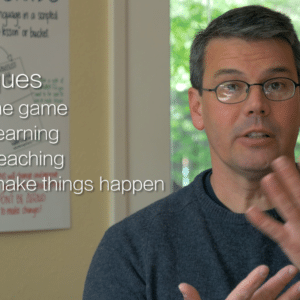During fluency hunting, you remain aware of everyone around you – young children playing, passers-by, and peers watching the hunt. You know that all these people are lunatic fringe, fully part of play, though they might not realize it, and you take care to hunt as obviously! as you can so they can follow along.
According to you go first, we are always modeling behavior – which means that our behavior is always being observed. Children, peers, elders, other animals, they’re always watching us. Humans have mirror neurons, structures in the brain that intrinsically cause us to personally experience that which we see another experiencing, and these neurons predispose us to learning from other humans and animals across a distance.
If we know this, we can design our play environment to support this ongoing observational learning that happens anyway, regardless of our intentions. This is key to involving children; no-pressure modeling, allowing them to absorb at their own pace and in their own way on the sidelines. For ages as young as early teens in the lunatic fringe, with their growing ability for mature “meta-” thinking, we can also give additional tools to accelerate their learning.
Copy-cat, Angel on your Shoulder, Sorry Charlie, with these techniques and many more, mature players can play an active role in skill diffusion and acquisition. Rather than just being an audience, the lunatic fringe can then become an asset, a community-wide safety net supporting and guiding other players.
If you’re playing a WAYK table game, the core group of players sitting around the table (“with their knees touching the table”) is called the inner circle, and any players behind them are the lunatic fringe. Anyone in an engaged, supportive lunatic fringe is called an angel on your shoulder.
Introducing the technique in language acquisition
Short: “Technique: Lunatic Fringe. Everyone outside the inner circle is in the lunatic fringe. Your only duty is to copy-cat what is going on in the inner circle. By doing so, you become angels on our shoulders, who will pull us through it.”
Applying the technique in language acquisition
The lunatic fringe can form in many ways. They can be far away sitting in the Meadow, playing in the corner appearing to ignore the game play, getting food, or sitting right behind the players in the inner circle, pulling them through it.
In the beginning, it can take some reminders to fully engage a close-in lunatic fringe. TQ Look at your Players, Look at your Angels is one we use often to remind the lunatic fringe to wake up and start pulling the inner circle through it. This technique essentially consists of saying, “technique: look at your players, look at your angels. Angels, find your players, give ’em a wink that you’ll be there for them and pull ’em through it. Players, find your Angels, point at them and say ‘remember to pull me through it!'”
But what about…?
Sometimes after playing for a while your lunatic fringe will have their hands in their laps, and be more of an audience than a group of angels. This tells you that they are full. Remind them to go rest up in the Meadow, get food, hit the bathroom, get whatever they need, and join back in just as soon as they feel ready.
Sometimes members of the lunatic fringe will not engage play by copy-catting or being angels, but instead will want translations (risking killing fairies) or ask distracting questions. For the most part, discourage distractions and non-player questions through limit (“limit – that’s a great question – but for later”) and offering up the Meadow (“if you’re in the lunatic fringe, but don’t have enough energy to angel, consider resting in the Meadow“).
For any players that you think “should” be playing or participating, we can’t say this enough: the most accelerated learning is contingent on sincere, complete consent. You can’t force players to learn quickly over the short-term without building long-term resentment that will eventually undermine all your work to build a learning community.
This is why the lunatic fringe is so important, and why we acknowledge so many manifestations of the fringe. We truly want players to call full right when they need to, and we truly want them to rest in the Meadow as long as they need, until they are ready to rejoin play. We can’t stress this enough. Accelerated learning is founded on consenting, happy players.
Some players are predisposed to being in the lunatic fringe. Young children are a good example of this. Sometime inner circle players will have children in their laps as they play, but for the most part, children learn best by orbiting around play in the lunatic fringe, combining it with their own play that may have nothing to do with the language you’re playing in.




